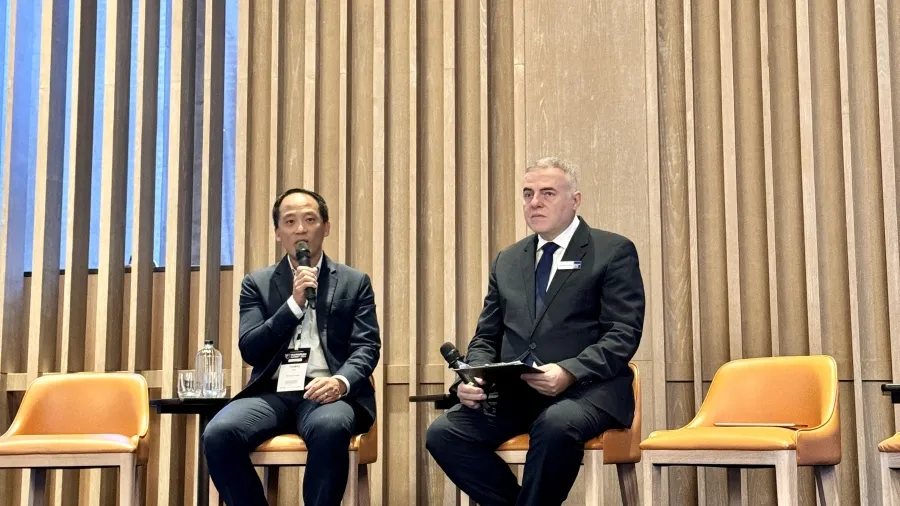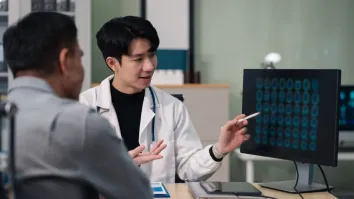
Gleneagles Hospital CEO plants his hospitality roots into healthcare
CEO Thomas Wee shares his strategy and vision for a patient-centric Singapore hospital at 2024 Healthcare Asia Summit.
GLENEAGLES Hospital in Singapore is working hard to deliver the full patient experience, elevating its patient-centric healthcare service over the industry field.
In a fireside chat with Healthcare Asia (HCA) Editor-in-Chief Tim Charlton at the 2024 HCA Summit, Gleneagles Hospital CEO Thomas Wee shared how his experience in hospitality shaped his perspective to focus on the entire patient journey on a sustained effort over time, rather than a one-time action for immediate clinical care.
“So, five years in hospitality in various regions of the world,” Wee said, painting a picture of his background at the forum. Then he proceeded to draw this conclusion, “I think one thing stays constant: People are looking for good service when they come to you. In healthcare, I think it’s no different.”
“A patient’s recovery is not just dependent on the number of hours in the operating theatre, but the entire journey. The experience has to be pleasant and positive so that they will return to us again,” he added, kicking off his spritely exchange with Charlton.
Gleneagles is known for its real customer focus. What are some initiatives that you are delivering on or planning around this?
As I mentioned, my experience with the hospitality industry is on the entire patient journey from the time that the patient comes through your door until he leaves. So, we map out the patient journey and identify… the areas where we can wow the patients.
In Singapore, we are known for food so in Gleneagles — and I think across all IHH hospitals — we are also famous for food provision. We work very hard to make sure that the patient’s nutrition is well taken care of. When I was in the army, I always remember the food rations served to the soldiers were very miserable.
In healthcare, we focus on supplementing the medical care that’s given to the patient. As I mentioned, healthcare is “high touch.” We talk about technology, but the patient needs that physical care and concern, especially in private healthcare, where a lot of the patients are lodged in a single room. You need our staff on the ground to constantly check in on the patients not just on their well-being, but also to deliver a message that we are there for them and if there’s anything extra we can do for them.
As you’ve been walking around the hospital, and talking to teams and noticing things, what kind of changes have you made to the culture, especially to promote inclusivity?
Most of you will know that in Singapore, the healthcare worker population is very diverse, so I think the culture is very different. As part of C management, we always walk the ground to hear and understand what their challenges are, what they want, and what they hope to see in the hospital. I remember one of the staff (members) from another country was saying, “Hey, you Singaporeans talk very fast… Can you tell them to slow down?” So, that’s something that we learned. Of course for patient care, imagine if you’re in the operating theatre and the nurse starts to say something very fast and the other person could not understand that. That is very dangerous, so that is something we passed on to make sure that our foreign staff can work well within our operating environment.
Another thing we did was to include the celebration of the various festivals and occasions of other races. In the hospital, Christmas and Chinese New Year are always big celebrations, but last year we started celebrating Ramadan, the Hari Raya, and the Deepavali for staff within the hospital. So, that was met with a lot of positive responses from the staff.
I think everybody knows the Singapore health system suffered quite a large outflow of nursing staff post-COVID. A lot were migrating and there’s a lot of demand in other countries. What is your approach to talent attraction and retention in this new environment where your health workers are more mobile?
When I joined the hospital about a year ago, we had about 20% of our base closed because we did not have enough nursing staff, and at a time when we were coming out of COVID. Rising demand and closing base is terrible. We cannot cater to the patient care needs of our population. So we went aggressively, on recruitment, both local and overseas, and I think that shouldn’t stop.
But on top of recruitment, we work very hard on stamping the attrition. We all know that when new staff come into the job, whether it’s nurses, patient care associates, or allied health professionals, they take six months to get used to the culture, the SOPs, and everything. We work very hard on retention. We took it upon ourselves to go out and engage the staff to find out where their pain points were. It could be accommodation or applying for permanent residency. If we engage them, we help them. We write to the authorities for them, our staff in Johor Bahru. We also provide a shuttle bus service to ease their travel.
Could you provide some insights into some of the pivotal moments or challenges that prompted Gleneagles to evaluate and reinforce its approach to resilience?
The staffing challenge was a big one. The other was the sun-setting of our electronic medical records system within the whole IHH; and Gleneagles was tasked to lead this change. But the staff has proven to be very resilient. Can you imagine changing from an Android to an iPhone? It takes a lot of customisation and a lot of getting used to. It was the same for us and even more complex.
Can you imagine all the medical records, medication, everything is inside. So there is a lot of complexity, but I must thank and praise my staff for being on the journey. We started the execution last August. Until today, they are still dealing properly and nobody has given up because we say, we must make this happen, and we can only succeed. That’s another pivotal moment we have gone through in the planning course.
How do you stay nimble and adaptable as a hospital? You know, with changing regulations and changing patient expectations?
Firstly, in the private sector, we are more flat. The communication, I believe, is clearer and faster. The next thing is alignment. When your staff is aligned with your vision, mission, and values, you can trust that whatever they do at the execution is aligned with what you want. You can never give them a foolproof, 100%, 10-year series of what can happen but as long as they know the company’s intent, you can trust that they’ll do the right things and do them right.



















 Advertise
Advertise





